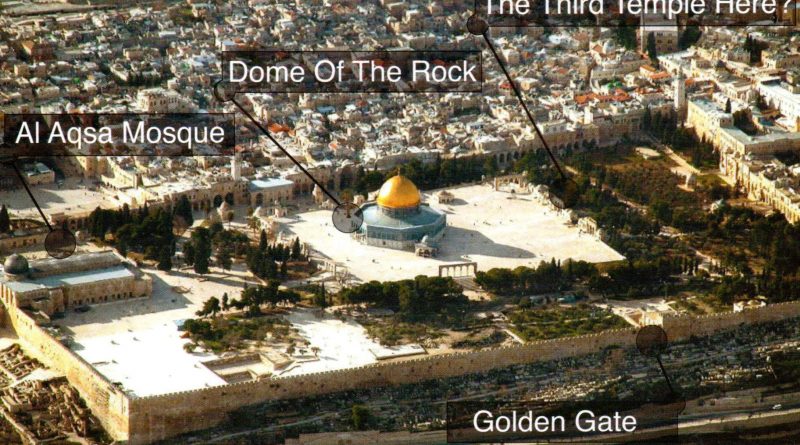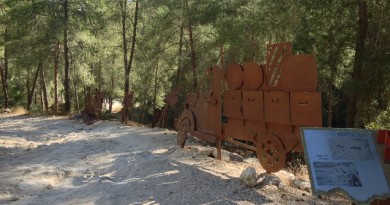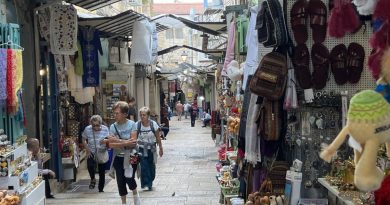Devarim 5776 – Tisha b’Av and Geopolitics
On this day, 2,602 years ago, the Temple in Jerusalem was destroyed for the first time.
On this day, 1,946 years ago, the Temple was destroyed for the second time.
On this day, 1,883 years ago, the Romans crushed the Bar Kochba revolt at Betar, outside Jerusalem.
On this day, 524 years ago, King Ferdinand expelled the Jews from Spain.
The ninth day of the Hebrew month of Av, (Tisha b’Av) is not a good day for the Jews. Normally today would be a fast day, a day of mourning. But we don’t fast on Shabbat (except for Yom Kippur) so we fast tomorrow instead.
Since we’re not observing Tisha b’Av today, today counts as the Shabbat before Tisha b’Av, known as “Shabbat Chazon,” for the opening words in today’s haftarah, “Chazon Yesheyahu,” the vision of Isaiah.
The haftarah is a reprimand from the prophet, chiding the people for their sinful ways.
Woe to a sinful nation, a people heavy with iniquity, evildoing seed, corrupt children. They forsook G‑d; they provoked the Holy One of Israel.
The rabbis say the First Temple was destroyed because of the people’s sinful behavior.
At the time of the Second Temple the rabbis didn’t see so much blatant sinning going on; they couldn’t blame the destruction of the Temple on the people being such terrible sinners. Instead we have the famous story of Kamza and Bar Kamza, and the idea that the Temple was destroyed because of baseless hatred between Jews.
I have mixed feelings about these theological reasons given for the destruction of the Temple.
On the one hand, it’s nice to try and find meaning in tragedy. And certainly the teaching about the Temple being destroyed because of sinat chinam, baseless hatred, is a lesson worth repeating, and perhaps that will be a d’var Torah for another day.
On the other hand, I have a concern that if we focus on theology we may lose sight of history. And as George Santayana famously said, “Those who cannot remember the past are condemned to repeat it.”
We are today living in the era of the “Third Jewish Commonwealth.” After a gap of nearly 2,000 years, Jews are once again living under Jewish sovereignty in the Land of Israel. Religiously, this is a miracle. Historically, it’s highly unlikely. Nowhere else in the world has a people regained political control of their homeland after so many centuries in exile.
And I’m worried for the Third Commonwealth. I want this to be the one that lasts, that really lasts, that isn’t destroyed after a few hundred years, or God forbid, less.
My home is Israel. I love Birmingham and this community is great, but Israel is home. I’m an Israeli citizen (and an American citizen). One of the reasons I chose to make aliyah is because the state of Israel is the most exciting thing to happen to the Jewish people in 2,000 years, and I wanted to be part of it. I wanted my family to be part of it, I wanted my children and grandchildren to be Israeli and to help build the world’s only Jewish state.
But I’m worried. Very worried.
The other day I met with someone who asked me “what keeps you up at night.” And this is what it is – worry over the future of Israel. If we screw it up, we could lose our home. I can’t think of another country on the planet that feels its existence is so precarious.
I’m not worried about ISIS next door in Syria and I’m not worried about Hezbollah in Lebanon. Well, not too worried. We have far and away the strongest military in the region. We can protect ourselves from external threats.
I’m worried we’ll make the wrong political and diplomatic decisions, and that those decisions will lead to our downfall.
If we look at history, what were the real reasons the First and Second Temples were destroyed?
Chutzpah.
The idea that our little country could challenge the superpowers of the day.
In the days of the First Temple, the Jewish leaders got tired of being part of the Babylonian Empire. They got tired of sending taxes to Iraq. So they decided to rebel. Israel sits in a strategic location, between Babylon and Egypt. They tried teaming up with Egypt, thinking Egypt would rather keep Babylon further away than Israel. They were wrong. Egypt was NOT willing to come to Israel’s rescue. The Babylonians crushed the rebellion and destroyed the Temple.
After the Persians kicked the Babylonians out, we were allowed to rebuild the Temple, beginning the Second Commonwealth. We were often nominally a part of this empire or that empire (Persian, Greek, Seleucid, Ptolomaic) but we were mostly left alone. And then as a result of a civil war among the Hasmoneans, the descendants of the Maccabees who kicked the Seleucids out, we came under Roman rule. In the late ‘60s CE the Israelites, having forgotten the history lesson of the destruction of the First Temple, tried taking on Rome. They failed. The rebellion was brutally suppressed and the Temple was destroyed in 70CE. Still not having learned, they tried another rebellion in 130, which was equally brutally suppressed, and it took another 1,818 years before we got another chance.
So what do we learn? If you’re a small country, you live your life under conditions that to some extent are dictated by forces greater than you are. Yes, we miraculously won wars against five Arab states in ’48, ’67, and ’73, but don’t kid yourselves, if the world’s one billion Muslims decided to take us out, we’d be finished.
We live in the modern world. We don’t have to pay taxes to America or Europe or some other Empire. However, our economy is totally dependent on trade with America and Europe. We don’t have the resources to get by on our own. We have to get along nicely with others.
Sometimes you have to choose what’s important to you. Should Israel be a Jewish state? A democratic state? Should we keep all of the land in the West Bank? There’s no way we can do all three. In order to be a Jewish and democratic state there is no alternative but for the Palestinians to have their own country. If we keep all the land, we have to choose between being Jewish and being democratic.
If we keep all the land, and make all the residents citizens, we will no longer be Jewish, because within a generation Muslims will outnumber Jews, and everything that makes Israel a Jewish state will disappear.
If we keep the land and don’t make the Palestinians citizens, we will no longer be democratic. We would have created an apartheid state with two different classes of citizens.
And the rest of the world won’t allow that. If we tried to go that approach, the Boycott, Divestment, Sanctions (BDS) movement would pick up tremendous steam. Western governments would boycott us. Our economy would tank. And by that time it would be too late to go back to a two-state solution. The only solution, the one foreign powers would cram down our throat, is to make all the Palestinians citizens of Israel. And that would be the end of the Jewish state, and my grandchildren would have to use their “escape hatch,” their American passports. And we’d have yet one more reason to mourn on Tisha b’Av.
The Mishnah teaches that when we have peace Tisha b’Av will be a day of feasting not fasting. Alas, we don’t have peace. I don’t know whether to say I feel pessimistic or optimistic. In the short run, I’m pessimistic. Both the Israelis and the Palestinians are cursed with inadequate leadership. On the Palestinian side, Abbas was a fool for not jumping at the deal that Ehud Olmert offered. On the Israeli side, Netanyahu’s government keeps building settlements which make the possibility of a Palestinian state ever more remote. I don’t feel anything is going to change until we have new leadership on both the Israeli and Palestinian sides.
Yet in the long run, I’m optimistic. I do believe eventually there will be peace in the Middle East. I do believe, eventually, there will be a Palestinian state living peacefully side by side with an Israeli state. And when I’m thinking really long term, I fantasize that the Muslims will invite us to build our Temple next to the Dome of the Rock, and we’ll all be up there praying together, sans barbecue.
But in the meantime, there is much work to be done, and I’ll be fasting tomorrow not to mourn the destruction of the Temple 2000 years ago, but to remind myself of the work that needs to be done to bring about that age of peace.
Shabbat Shalom



